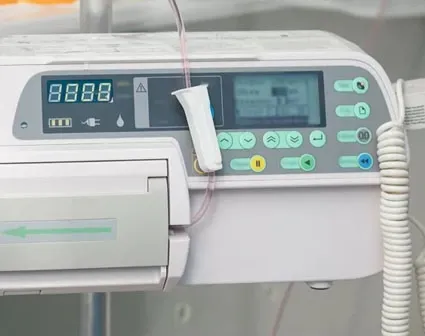Home Away From Home For Your Pet
The veterinary Intensive Care Unit (ICU) at the DCC Animal Hospital is dedicated to providing the highest quality care to critically ill small animals. Our veterinary ICU unit is managed by a team of trained veterinary doctors and staff. The care and well-being of your pet are assessed constantly by members of our veterinary ICU team.
A team approach is particularly important for critically ill patients. Each pet patient admitted to the veterinary intensive care unit has a team of caregivers, including internationally trained and acclaimed veterinarians. The ICU team works closely with other specialists within the hospital, such as surgery, internal medicine, cardiology, oncology, and neurology, to provide the highest level of care to each pet.
The veterinary Intensive Care Unit (ICU) at the DCC Animal Hospital is dedicated to providing the highest quality care to critically ill small animals. Our veterinary ICU unit is managed by a team of trained veterinary doctors and staff. The care and well-being of your pet are assessed constantly by members of our veterinary ICU team.
A team approach is particularly important for critically ill patients. Each pet patient admitted to the veterinary intensive care unit has a team of caregivers, including internationally trained and acclaimed veterinarians. The ICU team works closely with other specialists within the hospital, such as surgery, internal medicine, cardiology, oncology, and neurology, to provide the highest level of care to each pet.
Most of our veterinary pet patients come to us due to a life-threatening disease or condition and require special treatment (such as advanced pain management or complex fluid or drug therapy). Our expert veterinarians are well equipped with state-of-the-art machines and advanced techniques to make sure your pet recovers fast.
Our pet ICU is equipped with cutting-edge veterinary medical technology and supervised by highly-trained professionals who can handle any medical emergency. As a result, our pet ICU can provide a variety of specialist treatment options, including:
Congestive heart failure – In dogs, congestive heart failure occurs when the heart does not pump enough blood to the body, resulting in high pressure and fluid leakage into the lungs and other vital organs. Pulmonary edema- The buildup of an abnormal amount of fluid in the lung tissue, airways or air sacs is referred to as pulmonary edema. Coughing, rapid respiration, and weak pulse are some of the symptoms of pulmonary edema in dogs. Severe pancreatitis- Pancreatitis is a disorder that occurs when the pancreas gets inflamed. The resulting inflammation leads pancreatic digesting enzymes to spill into the abdominal cavity, causing damage to the liver, bile ducts, gall bladder, and intestines. GDV – Gastric dilatation and volvulus is the condition when the stomach fills with gas, causing gastric dilatation or bloating. Stabilization of your pet, decompression of the stomach, and surgery can help the stomach return to its normal position permanently.
Acute renal failure – The kidneys of a healthy pet perform a range of essential functions. On the other hand, acute renal failure can cause a sudden, rapid drop in kidney function, indicating immediate veterinarian care. Our veterinarian conducts blood and urine tests to confirm whether or not your dog has renal failure and identify the severity of the symptoms. Major trauma – One of the most common medical issues that pets face is trauma. Multiple injuries, both internal and external, can occur as a consequence of major trauma. A road accident is a common cause of severe trauma in dogs. Moreover, falling from a height can result in traumatic injury. Recovery period after major surgery – Full recovery can take anywhere from six weeks to four months, depending on the type of surgery. A complete and safe recovery needs meticulous post-operative care, followed by gradual therapy. Your veterinarian surgeon can give you an idea of how long it will take your pet to recover. Best Time to Return Home!
Your companion must remain in the hospital or veterinary ICU until their medical condition improves. We never want to keep animals away from their family for a longer period. However, it’s significant to understand that some surgical procedures and medical situations may necessitate hospitalization and regular monitoring.
Once your pet gets recovered from ailments, you can reach our veterinarians regularly to get post-recovery suggestions from them. You can schedule follow-up visits with us anytime. Our goal is to ensure that your cherished pet returns home safely and recovers completely.
Multiple problems, one consult.
Ask our doctors anything about
Pet Health
Concerned about your pet’s overall health? We have you covered
Pet Vaccinations
Need expert advice regarding your pets vaccinations? Our doctors will solve all your queries
Pet Behaviour
Worried about your pet’s unusual behaviour? Consult our doctors to get to the root of the problem
Second Opinion
Are you feeling doubtful over an ongoing pet treatment?










 How can we help?
How can we help?